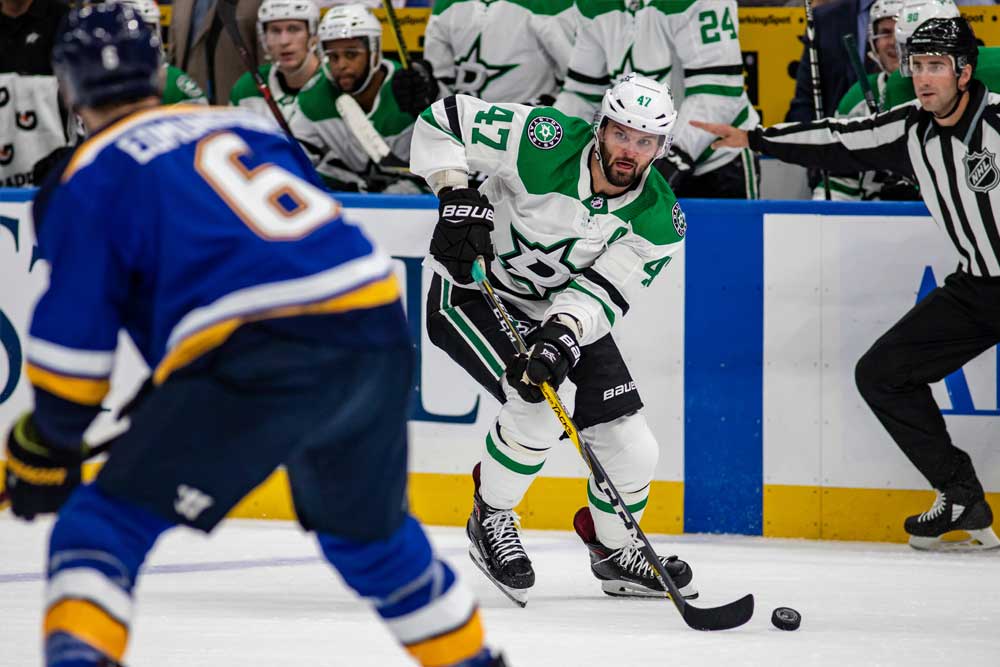Alexander Radulov Has Become Indispensable to Dallas Stars
Not too long ago, many wondered whether Alexander Radulov was even worth the trouble. His game-breaking skill was plain to see, but his name moved in lockstep with “character issues.” The stigma surrounding Russian players didn’t help his cause either.
Following a successful NHL rebirth in Montreal (54 points in 76 games), the 32-year-old is in his second season with the Dallas Stars — and he’s arguably become their most important forward. His strength on the puck stands out in a league that now covets pure speed. Moreover, that possession-based style is essential on a team that otherwise governs far too little of the play.
According to Natural Stat Trick, the 16-10-3 Stars are controlling just 46.4% of shot attempts (28th) and 47.8% of scoring chances (23rd) at 5-on-5.
When Radulov is on the ice, it’s an entirely different story. He leads the club’s forwards in CF% (52.4) and SCF% (57.5), and Dallas owns 64.5% of the goals scored during his shifts. In a vacuum, those are wonderful numbers. Relative to his team’s performance, they’re on another planet. He’s also posted 22 points in 19 games thus far, which is good for the highest points-per-game average (1.16) on the Stars and 21st in the NHL.
Through any lens, Radulov has been the club’s top performer in 2018-19.
His methodical approach is especially valuable in Dallas because it differs considerably from the rest of the team’s: Instead of banking on one-and-done rush opportunities, Radulov imposes his tempo on the opposition. Much like Jaromir Jagr later in his career, he has a knack for slowing the game down to a crawl and protecting the puck with defenders on his back. It’s rare to find a skilled forward who’s so comfortable in tight quarters.
This allows the Stars to buzz around the offensive zone and wear the other team down. It may not happen immediately, but Radulov is perfectly happy to play the long game. Defending for extended stretches is exhausting, and if the chances aren’t there right away, he’ll keep his nose to the grindstone until the right window presents itself.
In a sense, it’s akin to a boxer putting in body work on his opponent. While it isn’t pretty, more often than not, it pays off before the end of the fight.
Blueliners aren’t sure how to contain Radulov. He routinely gains the inside track by leveraging his 6’1”, 205-pound frame, but if you sag off him, he’ll pick you apart with his hands. He provides Dallas with a terrific combination of patience, talent and a willingness to embrace trench warfare.
Those traits have proven vital to captain Jamie Benn (24 points in 29 games).
Since the 29-year-old isn’t the intimidating power forward he once was, he requires a linemate who will engage in the thick of the action and win his share of battles down low. Unfortunately, the Stars aren’t exactly brimming with candidates: Jason Spezza, Mattias Janmark and Devin Shore don’t meet the job description, whereas Radek Faksa and Brett Ritchie have limited offensive upside. While 2013 10th overall pick Valeri Nichushkin should fit the bill at 6’4” and 210 pounds, he seems completely lost this season. He has a paltry four points in 22 games.
Head coach Jim Montgomery would surely prefer to spread his offense throughout the lineup, but the top unit is nowhere near as potent without Radulov. When he and Benn are paired up, the Stars own 54.1% of the shot attempts, 58.0% of the scoring chances and 72.7% of the goals scored. When Benn is with anyone else, his CF% is 47.2, his SCF% is 46.8 and his GF% is 33.3. Those are steep drop-offs.
The Stars need Benn to perform well, and he appears to need Radulov to maximize his skill set. They’re both very effective in space or on the cycle, either spotting a high-quality passing lane or resetting in order to slowly but surely capitalize on the zone time they accumulate.
Naturally, this formula wouldn’t work without shooters. That’s where sniper Tyler Seguin (26 points in 29 games) as well as defensemen John Klingberg (13 points in 16 games) and rookie Miro Heiskanen (13 points in 29 games) enter the fray. With Benn and Radulov soaking up the attention in congested areas, these marksmen can find their preferred soft spots in coverage. Seguin does well to drift into high-slot openings, while Heiskanen displays veteran savvy at the point, often hesitating for a second or moving laterally to create an optimal shooting angle. Klingberg, for his part, will roam absolutely anywhere on the ice if he feels it will grant him a scoring chance. He’s a total nightmare to defend because he’s a blueliner with no shackles.
Sure, the attack is top-heavy, but the alternative is watching subpar linemates neuter your best forwards. A top line that can produce instant offense as well as dictate the pace can cover up a lot of holes. Not only do the Stars dominate when that unit is deployed, but the forwards who come out for the next shift enjoy the benefits of that tilted ice.
With improved defensive structure and strong goaltending from starter Ben Bishop (2.23 GAA, 92.7 SV%), Dallas looks better prepared to win close games this season (7-3-3 in one-goal contests). However, the system cannot thrive without timely offense. On a team that ranks 23rd in goals per game, the first line must come through on a consistent basis — and it’s never more consistent than with Radulov leading the charge.
In a strange turn, this former pariah is now a world-class glue guy.
Recent Posts

How Corey Perry Is Making His Presence Felt With the Lightning
View Post »
How Adam Fox Pushed the Rangers Past the Penguins
View Post »

